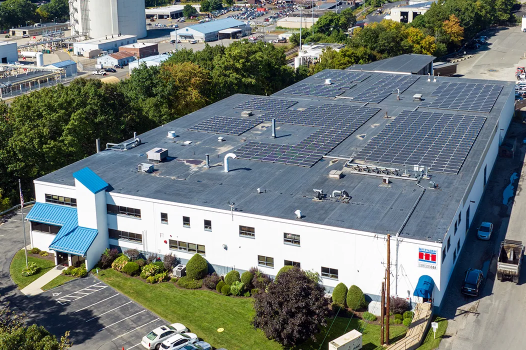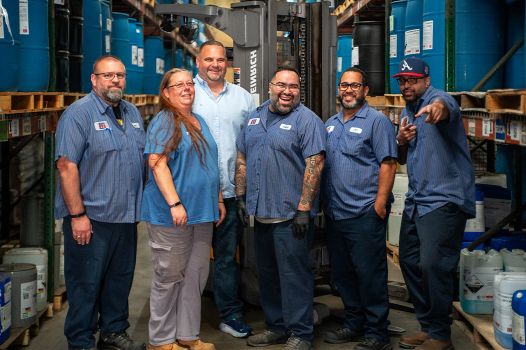Apothecaries Hall Company was founded by Dr. Gideon L. Platt
(Drug store, paint distributor and industrial chemicals)
Better results. Less chemistry.™

Hubbard-Hall’s History
A 175-Year Journey that Mirrors America’s Economic Transformation
From serving customers in a soda shop to chatting online with manufacturers across the USA, from local deliveries via horse and buggy to overseas container shipments, from fertilizers for farmers to parts per billion chemistries for chip makers… the thread that connects Apothecaries Hall to Hubbard-Hall follows the evolution of American manufacturing and is strengthened by 6 generations of family stewardship committed to sustainable growth.
View Timeline Watch Anniversary Video

American Adaptability
From Before the Civil War
In downtown Waterbury, CT, a small shop opened its doors in 1849 under the leadership of Dr. Gideon Platt. Known as Apothecaries Hall Company in the manner of the old guilds, this shop served the local populace – farmers, families, merchants, and builders, thus beginning a remarkable journey.
To the Turn of the 20th Century
Through the Civil War and the turn of the 20th century, agriculture was the backbone of the American economy, and Apothecaries Hall distributed fertilizers and animal care products under its Liberty Brand from Long Island to the Canadian border. As a local Apothecary, the company helped provide medical supplies during the Great Spanish Flu (1918 – 1920).
World Wars Impact
With the advent of World War I, America needed button and bullets and Waterbury became known as the Brass Capital of the World. Under the leadership of Isaac P. Kellogg, Apothecaries Hall developed chemistries and added anode capabilities to serve the rapidly growing industrial base of brass manufacturers.
The two world wars supercharged America’s transition from an agricultural economy to an industrial powerhouse and Apothecaries Hall morphed from fertilizer manufacturer to industrial chemical distributor.
Renamed “The Hubbard-Hall Chemical Company” in 1957 and now led by Frederic R. Kellogg, the company invested in greater distribution capabilities and increased its specialty product lines to support durable goods manufacturers working with metals and alloys of all types.

Geographic Expansion
As America’s industrial base moved from its birthplace in the Northeast to new sites in the South, so did Hubbard-Hall, establishing a manufacturing location in South Carolina in 1974. And when factories went international, so did Hubbard-Hall – serving customers with specialty chemicals for surface finishing from Mexico to Malaysia.
Turn of the 21st Century
Fast forward through another global pandemic to 2024 and an international industrial economy, Hubbard-Hall supplies specialty chemicals for surface cleaning, metal finishing and wastewater treatment to over 2,300 companies. Across industries from military to medical devices, aerospace to automobiles and hand tools to keeping high-tech fabs running up and down the Eastern Seaboard. Mix in strategic acquisitions over a century and meet the oldest independent chemical distributor in the country.

What Drives the Success of Hubbard-Hall?
“Adaptability, flexibility and total commitment to helping our customers.”
Chuck Kellogg (1931 – 2019)
Former Chairman/President

Continued Traditions
Now run by 6th generation family member Molly Kellogg, Hubbard-Hall holds certification for ISO 9001:2015, Responsible Distribution as certified by the ACD, and as a Women Owned Small Business. The company has also been recognized as a CT Top Workplace 8 times.
The company continues to operate with the spirit of innovation, resilience and commitment to community stewardship that reflects America’s great history and strong future.

1849

1852
Apothecaries Hall Incorporated
1863-1893
Archibald E. Rice, President until his death in 1893
(Great Grandfather)
1893-1895
Luzerne I. Munson, President
(Great, Great Uncle)

1894
The company entered the wholesale drug business
1895-1905
Frederic B. Rice, President
(Great, Great Uncle)

1905-1949
Issac P. Kellogg, President
(Great Grandfather)
1912
Anode foundry was added

1920s
Diversification into agriculture.
Apothecaries Hall began making their own fertilizer under the Liberty Brand for tobacco, potatoes, market gardens, and fruit orchards.

1930s
Insecticides and fungicides
1949-1953
Evan Jones, President
1950
Sold retail drug business

1953-1960
Frederic R. Kellogg, President
(Grandfather)
1954
Sold wholesale drug business

1957
MERGER
Company name changed to The Hubbard-Hall Chemical Co. after merger with three small fertilizer manufacturers
1960-1966
Edward R. Jones, President
1964
Hubbard-Hall became a wholly owned subsidiary of Kerr-McGee Corp

1966-1999
Charles T. Kellogg, President, CEO & Chairman
(Father)
1968
Connrex purchased assets of the chemical division from Kerr-McGee

1971
Frederic R. Kellogg, Charles T. Kellogg and George Davis purchased assets of Hubbard-Hall from Connrex
1974
Opened manufacturing plant in Inman, SC
(Key Markets: Surface Finishing)

1976
Purchased Smith Chemical, Providence, RI
(Key Markets: Jewelry, Plating)

1977
Built new plant in Lincoln, RI
1986
Renamed Hubbard-Hall, Inc.
1989
H-Help (Hubbard-Hall) Environmental Learning Programs launched

1990
Opened sales office in W. Springfield, MA

1991
Purchased Mitchell-Bradford International, Milford, CT
(Key Markets: Blackening Compounds, Antiquing Solutions)
1992
Start up of WaterWorks Parts Washer Safety Service

1996
Major plant expansion in Inman, SC
1997
CHAMP (Chemical Handling and Management Program) launched

1998
Acquired assets of Jeffrey Chemical in Wilmington, MA
(Key Markets: PCB, Semiconductors, Metal Finishing)
1999
Acquired solvent business of George Mann Chemical, Providence, RI
1999
Acquired American Chemical, Providence, RI

1999-2014
Andrew K. Skipp, President / CEO
(Cousin)
2000
Purchased solvent business of Guard-All Chemical, Norwalk, CT
2006
Acquired Enequist Chemical Co., Brooklyn, NY

2014-Present
Molly Kellogg, President, CEO & Chairman
(Representing the 6th generation of Kellogg family owners)

2019
Purchased Arbortech, patented membrane technology

2022
Purchased Torch Surface Technologies
(Key Markets: Specialty phosphates for pretreatment)
2023
Purchased BCT, a manufacturer of biologics for waste water treatment
2024
Purchased Prosys Finishing Technology
Increasing offerings in plating brighteners, cleaners, and other metal finishing specialties




